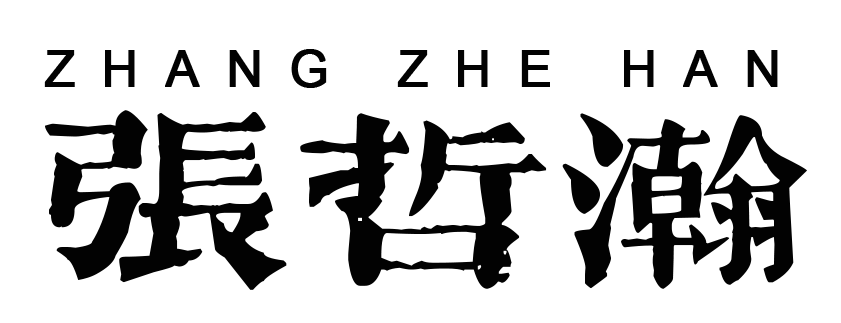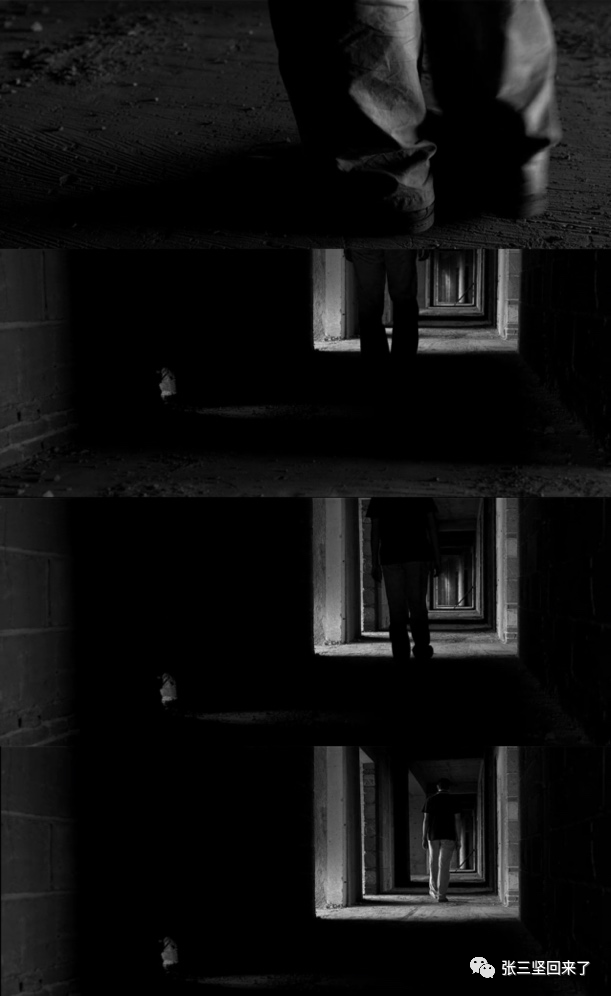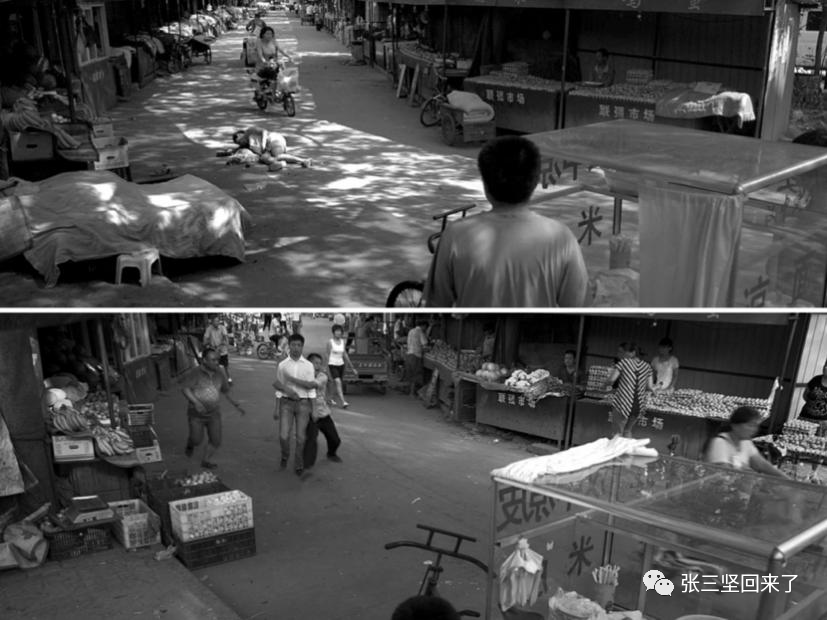Zhang Sanjian’s “Diaper”
Zhang Sanjian is back 2023-01-15 23:05 Posted on Shanghai
Although the snow is fluttering outside the window, today I want to share with everyone a short film ‘Great Heat’ that was nominated at the 2014 Venice International Film Festival.
The first shot of the film shows a weathered, rough face in a broken mirror, with the protagonist trimming his beard holding a corner of the shattered mirror. This shot is worth contemplating. If we revisit this scene after watching the entire film in a reverse order, it essentially conveys the protagonist’s ruined and incomplete life from the beginning, foreshadowing his fragmented existence. The broken mirror reflects the face he imagines himself to have – an unsmiling, colorless visage. This austere black and white texture is consistent throughout the film.
Analyzing the character’s actions, why does he trim his beard? Usually, for someone in dire straits, basic needs for food and warmth far exceed the need for appearance. According to Maslow’s hierarchy of needs, only after fulfilling basic physiological needs does one have the surplus to seek safety, social, and self-actualization needs. Yet, he uses a broken mirror to trim his beard, showing that deep inside, he still cares about his image and respects his profession, maintaining pride and principles even in adversity.
The first shot in the mirror is taken from a high angle, looking down. Then, the second shot switches to a low angle, moving up from the feet to the background, leading the protagonist into an abandoned building corridor. This alternating camera language contrasts perspectives, like the extremes of sweltering heat and cold noodles, or discussing whether there’s a true distinction between good and evil, black and white, kindness and justice
At the end of this dark, alternating corridor of ruins, the protagonist exits the frame, and the name of the film then appears on the screen. A mechanical, cold voice announces news of an airport explosion. The metaphorical contrasts are everywhere, symbolizing the intense heat of midsummer, pushing endurance and temperament to their limits, ready to snap. Vendors selling watermelons, stall owners with palm-leaf fans, faces glistening with sticky sweat, collapsing in the summer heat of the marketplace.
Then, the second protagonist appears: he is cutting cold noodles, adding a refreshing context to the scene, filled with tension in the ordinary. This is followed by the film’s first conflict point. A pregnant woman walking on the street is suddenly knocked down. The first protagonist immediately rushes to pursue the perpetrator, while others on the street remain indifferent, even spectating. Only the second protagonist puts down his knife and goes to help the woman, making a call for assistance. Thus, a contrast is established again: the first protagonist casts an angry look at those who don’t offer help, forming a silent alliance with the second protagonist over a bowl of cold noodles.
There’s a fascinating point regarding the camera work: the shot of the pregnant woman being hit and the final scene of the male protagonist’s arrest are taken from the same angle, observed from the perspective of the cold noodle vendor in the bottom right corner. However, in the first instance, the protagonist is a helper, while in the second, he is the informer. The director uses similar shots to express two different situations, perhaps implying that good and evil might just be a moment’s thought in the same person, not necessarily absolute opposites.
The film largely lacks dialogue, moving the plot forward through actions, expressions, narrations, and even wall graffiti in a silent black-and-white tone. The first protagonist is a teacher, wanted for a murder in the hospital, driven by a delay in signing at the hospital and missing the critical treatment window. This tragic separation of his family marks the beginning of his incomplete soul and life, shattering a civilized man due to the contradiction between the system and human nature.
In the end, he changes into respectable clothing and goes to ‘surrender’ after grooming himself. Maybe at that moment, his dignity is finally restored. Even after his arrest, he tells the cold noodle vendor not to forget to collect the reward for reporting him, showing he is still a person with clear moral principles and distinction – he took the vendor’s money and then gave him a wanted notice, telling him he could get better compensation by reporting him. He implies that he would repay his debt, as human relations are based on equal value, with nothing owed on either side.
This is a film with a distinctive directorial style, expressed through plain acting, silent dialogue, and a slow pace, delivering a fierce contradiction, a sorrowful melancholy, and a profound reality. The frozen social morals are like children gathered together to burn a mouse alive. The slowly burning flame is one of the few colors in the film, contrasting the fragile human nature and indifferent hearts under the highly developed steel beast. It’s so real that it’s daunting yet impossible to turn away from.
I always believe that a good film, whether it’s a short film, movie, or TV show, should withstand the scrutiny and interpretation of the audience. After watching, it should resonate, inspire, and enlighten with love, provoking reflection. These are the power and true value of art. Of course, another important function and duty of movies is to reveal the dark sides of society or our life that might be overlooked, thus allowing us to reflect on our lives through this mirror of film, examining the era and spirit we are experiencing or losing.
“Great Heat” constructs the characters and psychological traits of two protagonists from both positive and negative aspects, yet uses the contradictory realities to prove that human nature is not absolutely good or evil. It uses a surreal perspective to contrast the heat of the weather and the coolness of the cold noodles, reflecting the warmth and coldness of human emotions, the contrast between unfinished ruins and towering buildings, composing a lament of the human world.
Perhaps what’s hotter than the extreme heat is the spontaneous kindness, and what’s colder than the cold noodles is the ignorance of indifference. Shouldn’t we blow the horn and extend a helping hand when no one is waving in the light of the fire, instead of being a silent bystander without knowing the truth? After all, ‘In the end, when they come for me, there will be no one left to speak for me.
Sanjian turned one year old!!! Mom said she’d prepare a diaper for Sanjian baby, and here comes the “diaper.” A teacher’s words gave me a new understanding of “diapers.” He said children need diapers for their waste, while adults use knowledge, cultivation, and wisdom to contain emotions and situations. I once thought I was invincible, ready for all future challenges. Confidence and arrogance are often just a wet paper apart. The future is long with unknown challenges ahead; humility and tolerance are crucial. Emotions in adults, unlike the open cries of children, are often restrained. Emotions, like energy, shouldn’t be blocked or suppressed; a better way is to let them flow gently within. Like recycling negative emotions such as anger, isn’t it possible to reuse waste? This is a film analysis assignment and a “diaper” gift for Sanjian. Sanjian, as a child, needs to learn to grow up; learning is an unceasing journey, and hesitation leads to isolation.
I often see many people saying, “Let the world be destroyed, it won’t get any better.” That’s because you want to give up on yourself. If you become better, the world will become better, won’t it? Just like a fan’s message to Sanjian: eating more chicken wings helps you fly further. Haha, Sanjian remembers this!










Ok tomorrow I will eat Saru Soba !!
翻译 Translate
I never read this article!! 😧😧😧 How ?
翻译 Translate
A profound analysis of “Great Heat” that captures the essence of human struggle and resilience.
翻译 Translate